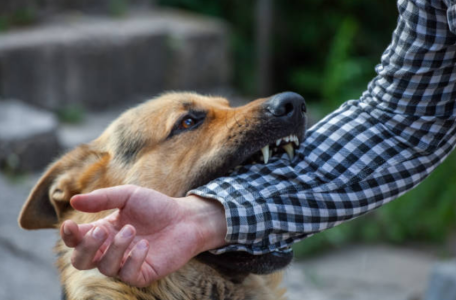Australia Post responds to surge in attacks with urgent new move
By
Gian T
- Replies 51
If you’ve ever noticed your postie acting a bit cautious near your front gate, there may be more to it than meets the eye.
A new safety step has just been rolled out following a rise in troubling incidents that have affected workers across the country in unexpected ways.
It’s a move aimed at protecting those who deliver through all kinds of challenges.
Over the past six months alone, more than 1,150 threatening dog encounters have been reported by Australia Post workers.
That’s an average of nine posties every single day forced to run for their safety—hardly the 'walk in the park' some might imagine the job to be.
Russell Munro, Australia Post’s General Manager of Safety, didn’t mince words:
‘Despite public awareness efforts and rigorous safety protocols, we continue to see alarming rates of dog-related incidents. Apart from the normal bites and scratches, we’ve seen posties knocked off bikes. We’ve also seen psychological trauma for our posties following serious dog attacks. Last year, one of our posties had her foot seriously injured when a dog bit through her boot.’
In response, Australia Post is rolling out a new, non-harmful deterrent: citronella spray.
This water-based spray isn’t dangerous to dogs, but it’s proven to be a powerful distraction—giving posties those precious extra seconds to protect themselves and call for help.
After a successful trial in some of the worst-affected areas in NSW and Queensland, where it deterred 80 per cent of attacks, the spray will now be issued to all posties by the end of July, with those in high-risk areas first in line.
But don’t worry—this isn’t about turning your friendly neighbourhood postie into a vigilante.
Employees will receive training and are instructed to use the spray only as a last resort when all other options have failed.
Bronwyn Adamson, a former vet nurse and now a postie in Western Australia, knows all too well the risks.
‘The incident occurred when I was delivering a parcel requiring a signature,’ she recalled.
‘A dog escaped from behind a gate and bit me on my breast, leaving a puncture wound and severe bruising which developed into a golf ball-sized haematoma.’
For Bronwyn and many others, the new spray offers much-needed peace of mind.
Australia Post has even released confronting footage showing aggressive dogs bursting out of front doors, leaping fences, and chasing down postal workers.
In one clip, a postie is seen clutching his leg and collapsing as a resident desperately tries to restrain her dog.
It’s a sobering reminder that these aren’t just statistics—they’re real people facing real danger.
Dog attacks on posties aren’t limited to one area—they’re happening all over Australia.
Here’s a breakdown of the worst-affected regions since November:
Nearly 40 per cent of attacks in the past six months happened on a customer’s property, and in half of those cases, the front door had been propped open.
Roaming dogs are also a significant concern, accounting for 39 per cent of all incidents on the street.
Australia Post is urging all pet owners to do their part: if you’re expecting a delivery, please secure your dog in a contained area, a separate room, or behind a locked gate.
It’s a simple step that could prevent a serious injury—or worse.
We know many of our Seniors Discount Club members are dog lovers and responsible pet owners.
But even the friendliest pooch can get a fright or become territorial when a stranger approaches.
Let’s all do our bit to keep our posties safe—after all, they’re the ones braving the elements (and sometimes, our four-legged friends) to bring us our mail and parcels.
 Have you or someone you know had a close call with a dog and a delivery worker? Do you think citronella spray is a good solution, or is there more we could be doing as a community? Share your thoughts and stories in the comments below.
Have you or someone you know had a close call with a dog and a delivery worker? Do you think citronella spray is a good solution, or is there more we could be doing as a community? Share your thoughts and stories in the comments below.
A new safety step has just been rolled out following a rise in troubling incidents that have affected workers across the country in unexpected ways.
It’s a move aimed at protecting those who deliver through all kinds of challenges.
Over the past six months alone, more than 1,150 threatening dog encounters have been reported by Australia Post workers.
That’s an average of nine posties every single day forced to run for their safety—hardly the 'walk in the park' some might imagine the job to be.
Russell Munro, Australia Post’s General Manager of Safety, didn’t mince words:
‘Despite public awareness efforts and rigorous safety protocols, we continue to see alarming rates of dog-related incidents. Apart from the normal bites and scratches, we’ve seen posties knocked off bikes. We’ve also seen psychological trauma for our posties following serious dog attacks. Last year, one of our posties had her foot seriously injured when a dog bit through her boot.’
In response, Australia Post is rolling out a new, non-harmful deterrent: citronella spray.
This water-based spray isn’t dangerous to dogs, but it’s proven to be a powerful distraction—giving posties those precious extra seconds to protect themselves and call for help.
After a successful trial in some of the worst-affected areas in NSW and Queensland, where it deterred 80 per cent of attacks, the spray will now be issued to all posties by the end of July, with those in high-risk areas first in line.
But don’t worry—this isn’t about turning your friendly neighbourhood postie into a vigilante.
Employees will receive training and are instructed to use the spray only as a last resort when all other options have failed.
Bronwyn Adamson, a former vet nurse and now a postie in Western Australia, knows all too well the risks.
‘A dog escaped from behind a gate and bit me on my breast, leaving a puncture wound and severe bruising which developed into a golf ball-sized haematoma.’
For Bronwyn and many others, the new spray offers much-needed peace of mind.
Australia Post has even released confronting footage showing aggressive dogs bursting out of front doors, leaping fences, and chasing down postal workers.
In one clip, a postie is seen clutching his leg and collapsing as a resident desperately tries to restrain her dog.
Dog attacks on posties aren’t limited to one area—they’re happening all over Australia.
Here’s a breakdown of the worst-affected regions since November:
- Queensland (388 incidents): Darra, Bundamba, Toowoomba
- New South Wales (329): Moree, Penrith, Waterloo
- Western Australia (184): Joondalup, Geraldton, Malaga
- Victoria (138): Oakleigh South, Mooroolbark, Deepdene, Mornington
- South Australia (60): Glynde, Lonsdale, Edinburgh North, Salisbury South
- Tasmania (27): Launceston, Burnie, Devonport, Hobart
- ACT (17): Canberra South, Mitchell, Tuggeranong
- Northern Territory (10): Katherine, Palmerston, Darwin
Nearly 40 per cent of attacks in the past six months happened on a customer’s property, and in half of those cases, the front door had been propped open.
Australia Post is urging all pet owners to do their part: if you’re expecting a delivery, please secure your dog in a contained area, a separate room, or behind a locked gate.
It’s a simple step that could prevent a serious injury—or worse.
We know many of our Seniors Discount Club members are dog lovers and responsible pet owners.
But even the friendliest pooch can get a fright or become territorial when a stranger approaches.
Let’s all do our bit to keep our posties safe—after all, they’re the ones braving the elements (and sometimes, our four-legged friends) to bring us our mail and parcels.
Key Takeaways
- Australia Post will equip all posties with citronella spray by the end of July, following a sharp increase in dog attacks nationwide over the past six months.
- More than 1,150 dog-related incidents have been recorded since November, with posties suffering from bites, injuries, and psychological trauma.
- The citronella spray, which is non-harmful and water-based, will only be used as a last resort and has already proven to deter 80 per cent of attacks during initial trials in high-risk areas.
- Australia Post is urging pet owners to secure their dogs—either in a separate room or behind a locked gate—when receiving a delivery to help prevent further attacks on postal workers.








